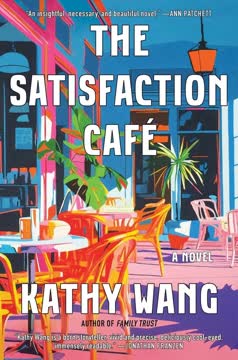Plot Summary
Attic Beginnings, Shattered Marriage
Joan Liang arrives in California from Taiwan, living in a Palo Alto attic, scraping by as a student and housekeeper. Her upbringing is marked by scarcity, family disappointment, and her mother's bitterness. Marriage is seen as a necessary step, not a romantic one. She weds Milton Liu, a fellow Chinese immigrant, hoping for stability and belonging. But the marriage quickly unravels—Milton's sexual demands, emotional coldness, and a shocking incident in a video store lead Joan to stab him with a pair of calipers. The act is both an accident and a desperate assertion of self. The marriage ends almost as soon as it began, leaving Joan isolated, shamed, and forced to start over in a foreign land, her dreams of American happiness in tatters.
Stabbing Milton, Starting Over
After the stabbing, Joan faces the coldness of her parents, who care only for appearances and money, not her well-being. The Chinese community in Palo Alto turns against her, siding with Milton's version of events. Joan's friends drift away, and she is left with only her own resourcefulness. She throws herself into work and night classes, finding solace in small pleasures and the routines of survival. Her loneliness is profound, but she refuses to be defeated. She begins to take community classes, learning new skills and slowly rebuilding her sense of self. The trauma of her failed marriage lingers, but Joan's determination to carve out a life for herself in America grows stronger.
Exile and Loneliness
Joan's world shrinks to work, school, and the occasional class. She meets Bill Lauder, a wealthy, older white man, on a Stanford bench. Their connection is unexpected—Bill is charming, attentive, and offers Joan a glimpse of a life she never imagined. He is divorced, with grown children, and represents a world of privilege and ease. Joan is wary but drawn to his warmth and the possibilities he offers. Their relationship develops slowly, marked by cultural misunderstandings and the vast gulf between their backgrounds. Joan is acutely aware of her outsider status, but Bill's affection and the promise of security tempt her to take a risk on love again.
Bill Lauder's Proposal
Bill proposes marriage, and Joan is thrust into a new world of wealth, contracts, and family politics. She negotiates a prenuptial agreement, insisting on a share of Bill's beloved Falling House if the marriage lasts. The process is both empowering and humiliating, highlighting the transactional nature of marriage in her world. Bill's children, Juliet and Theo, are shocked and resentful, seeing Joan as an interloper. Joan is both excited and anxious—she is marrying not just a man, but a family, a house, and a legacy. The wedding is simple, but the stakes are high. Joan steps into her new life with hope, but also a deep sense of uncertainty.
May–December, New Family
Joan struggles to fit into Bill's world. She is younger, Chinese, and an outsider among the wealthy, white Palo Alto elite. Bill's family is complicated—ex-wives, adult children, and siblings with their own resentments. Joan faces subtle and overt racism, classism, and exclusion. She tries to find her place, volunteering, attending social events, and managing the vast Falling House. Motherhood arrives with the birth of Jamie, and later, the adoption of Lee, Misty's abandoned child. Joan's sense of self is constantly challenged by her roles as wife, mother, and perpetual outsider. She endures betrayals, loneliness, and the constant pressure to prove her worth.
The House and the Contract
Falling House, Bill's architectural masterpiece, becomes a central symbol—of security, status, and the fragility of happiness. Joan's insistence on a share of the house in the prenup is both practical and emotional. The house is a site of family gatherings, conflicts, and betrayals. Bill's children covet it, seeing it as their birthright. Joan pours herself into making it a home, but it is always tinged with the knowledge that it could be taken away. The house represents both the promise and the limits of assimilation, love, and belonging in America.
Navigating Wealth and Outsiderhood
Joan navigates the treacherous waters of Palo Alto's elite. She is invited to parties, fundraisers, and social events, but always feels the sting of exclusion. The other wives are alternately friendly and dismissive. Joan finds small ways to assert herself—through her taste, her parenting, and her quiet competence. She befriends Patty, a Japanese-American woman who becomes her confidante and, later, the manager of her café. Joan's outsider status is both a source of pain and a wellspring of resilience. She learns to find satisfaction in small victories and to endure the slights and betrayals of those around her.
Motherhood, Nannies, and Theft
Motherhood is both a joy and a trial for Joan. She struggles to find reliable childcare, cycling through a series of nannies who steal from her or abandon the job. The experience is a harsh lesson in trust and the complexities of immigrant life. Joan's relationship with her own parents remains fraught—they are critical, demanding, and emotionally distant. She pours her energy into raising Jamie and, later, Lee, determined to give them the security and love she never had. The challenges of parenting in a foreign culture, with little support, test Joan's endurance and ingenuity.
Misty's Baby, Lee's Arrival
Misty, Bill's troubled sister, becomes pregnant and abandons her baby, Leonie, with Joan. Joan adopts the child, renaming her Lee, and raises her as her own. The act is both an act of love and a reclamation of agency—Joan chooses her family, forging bonds that transcend blood. The arrival of Lee brings new challenges—questions of identity, belonging, and the meaning of motherhood. Joan's relationship with Bill's family is further complicated, but she finds strength in her chosen role as Lee's mother. The experience cements Joan's belief in the power of self-determination and the importance of kindness.
The Café Dream Awakens
As her children grow and her marriage weathers betrayals, Joan dreams of creating a place where people can find the satisfaction and connection she has long sought. The idea of the Satisfaction Café takes root—a space for conversation, comfort, and community. Joan's childhood longing for a place of warmth and acceptance becomes a blueprint for her future. She enlists Patty and a cast of hosts, each with their own stories and talents. The café becomes a haven for the lonely, the lost, and the searching—a reflection of Joan's own journey and her hard-won wisdom.
Betrayals, Endurance, and Survival
Bill's repeated infidelities test Joan's resolve. She endures humiliation, anger, and the temptation to leave, but ultimately chooses to stay—for her children, for the life she has built, and for the small satisfactions that remain. The betrayals are both personal and universal—Joan recognizes the limits of love, the inevitability of disappointment, and the necessity of endurance. She finds solace in her friendships, her children, and the work of building the café. The experience deepens her empathy and her understanding of the complexities of marriage, family, and survival.
Children, Loss, and Legacy
As Jamie and Lee grow into adulthood, they face their own struggles—trauma, failed relationships, and the search for purpose. Bill's illness and death leave Joan a widow, and the destruction of Falling House by arson (set by Theo) robs her of her home. Joan and her children are forced to start over, living in a modest townhouse and rebuilding their lives. The café becomes a new center of gravity, a place where Joan's legacy of kindness, resilience, and connection can endure. The family's story is one of loss, adaptation, and the ongoing search for meaning in the face of impermanence.
The Demon Rock Returns
Joan is increasingly haunted by memories of her childhood in Taiwan—the demon rock in her apartment courtyard, a symbol of trauma, endurance, and the inescapability of the past. As she ages and her memory begins to fail, Joan reflects on the cycles of suffering and survival that have shaped her life. She recognizes the limits of control, the inevitability of loss, and the necessity of acceptance. The demon rock becomes a metaphor for the burdens we carry and the peace that comes from letting go.
The Satisfaction Café Opens
Joan finally opens the Satisfaction Café, pouring her energy and wisdom into creating a space for connection and healing. The café is a success, drawing a diverse clientele and a staff of hosts who offer conversation, comfort, and companionship. Joan finds fulfillment in her work, her friendships, and the small joys of daily life. The café becomes a living testament to her resilience, her generosity, and her belief in the power of kindness. It is a place where loneliness is acknowledged, where stories are shared, and where satisfaction—however fleeting—can be found.
Decline, Memory, and Farewell
As Joan's memory declines, she is forced to confront her mortality and the limits of her independence. Her children rally around her, but she insists on maintaining her dignity and agency. Joan prepares for her own death with the same pragmatism and grace that have defined her life. She leaves behind instructions, gifts, and words of wisdom for her children and friends. Her final act is one of self-determination, choosing the time and manner of her passing. Joan's farewell is both heartbreaking and triumphant—a testament to a life lived on her own terms.
After Joan: Grief and Continuance
In the aftermath of Joan's death, Jamie, Lee, and the extended family grapple with grief, regret, and the challenge of moving forward. The café endures, a beacon of Joan's spirit and a source of comfort for those she leaves behind. Jamie and Lee find new ways to support each other, honoring their mother's legacy by caring for the café and for one another. The family's story continues, marked by loss but also by resilience, humor, and the enduring power of connection.
The Café's Enduring Light
The Satisfaction Café stands as a living memorial to Joan's journey—a place where strangers become friends, where stories are shared, and where the search for satisfaction continues. The café's tables, each unique, reflect the diversity and beauty of its patrons. The staff, led by Patty and Jamie, carry on Joan's mission of kindness and connection. The café's light endures, offering hope and comfort to all who enter. In the end, Joan's greatest gift is not the house, the money, or even the café itself, but the example of a life lived with courage, compassion, and the willingness to begin again.
Characters
Joan Liang
Joan is the heart of the novel—a Taiwanese immigrant whose life is shaped by scarcity, disappointment, and the relentless pursuit of security and satisfaction. Her early years are marked by familial neglect and the burden of being an unwanted daughter. In America, she endures poverty, a disastrous first marriage, and the loneliness of exile. Joan's psychological journey is one of survival, adaptation, and the gradual reclamation of agency. She is pragmatic, resourceful, and quietly rebellious, refusing to be defined by others' expectations. Her relationships—with Bill, her children, and her friends—are complex, marked by both love and disappointment. Joan's greatest achievement is the creation of the Satisfaction Café, a space that embodies her hard-won wisdom and her belief in the power of kindness and connection.
Bill Lauder
Bill is a wealthy, older white man whose life is defined by privilege, restlessness, and a string of failed marriages. He is both generous and self-absorbed, offering Joan security and affection but also infidelity and emotional distance. Bill's relationship with Joan is marked by cultural misunderstandings, power imbalances, and moments of genuine tenderness. He is a loving but imperfect father, haunted by regrets and the knowledge that his legacy is fragile. Bill's decline and death force the family to confront the limits of love, the inevitability of loss, and the challenge of forgiveness.
Jamie Lauder
Jamie is Joan and Bill's son, a quiet, rule-following child who grows into a man marked by both achievement and pain. He seeks approval, first through academic and professional success, then through military service. Jamie's experiences in the Navy SEALs and the trauma of war leave him adrift, struggling to find meaning and connection. He is loyal, dutiful, and deeply affected by his mother's love and expectations. Jamie's journey is one of healing, as he finds purpose in helping run the Satisfaction Café and supporting his sister. His relationship with Joan is both a source of comfort and a reminder of the complexities of family love.
Lee (Leonie) Lauder
Lee is Misty's biological daughter, adopted and raised by Joan and Bill. Her mixed heritage and unconventional family history make her both an insider and outsider. Lee is intelligent, independent, and restless, struggling to define herself apart from her family's expectations. Her relationships—with men, with her brother, and with her mothers—are marked by both longing and ambivalence. Lee's psychological arc is one of self-discovery, as she learns to accept her past, her limitations, and the possibility of happiness on her own terms.
Misty Lauder
Misty is Bill's much younger sister, a perennial outsider and source of family drama. She is impulsive, self-destructive, and often irresponsible, but also capable of surprising insight and generosity. Misty's abandonment of her daughter, Lee, is both a failure and an act of honesty—she knows her limits and refuses to pretend otherwise. Her relationship with Joan is complicated, marked by both rivalry and genuine affection. Misty embodies the novel's themes of chosen family, the limits of forgiveness, and the necessity of self-acceptance.
Patty Sugimoto
Patty is a Japanese-American woman who becomes Joan's confidante, nanny, and later, the manager of the Satisfaction Café. She is practical, nurturing, and quietly wise, offering Joan the support and understanding she lacks elsewhere. Patty's own experiences of loss and adaptation mirror Joan's, and their friendship is a source of strength for both. Patty's presence in the café and in Joan's life is a testament to the power of chosen family and the importance of kindness.
Theo Lauder
Theo is Bill's son from his first marriage, a man marked by privilege, resentment, and a sense of perpetual grievance. He is charming but self-destructive, unable to find satisfaction or purpose. Theo's jealousy and anger culminate in the arson that destroys Falling House, a desperate act that reflects his sense of exclusion and loss. His relationship with Joan and his half-siblings is fraught, but not without moments of vulnerability. Theo embodies the dangers of entitlement, the corrosive effects of envy, and the possibility of redemption.
Juliet Lauder
Juliet is Bill's daughter, a high-achieving, emotionally guarded woman who struggles to reconcile her loyalty to her father with her resentment of his choices. She is both a rival and a reluctant ally to Joan, navigating the complexities of blended family life with pragmatism and occasional warmth. Juliet's own disappointments and failed relationships mirror the novel's themes of expectation, loss, and the search for meaning.
Ellison
Ellison is a former tech worker who becomes a host at the Satisfaction Café. Gender-nonconforming, witty, and perceptive, Ellison finds in the café a place of belonging and purpose. His friendship with Joan and Jamie is marked by humor, honesty, and mutual support. Ellison's journey reflects the novel's celebration of difference, resilience, and the healing power of community.
Nelson Das
Nelson is Bill's longtime lawyer and a quiet witness to the family's triumphs and tragedies. He is professional, discreet, and occasionally wry, offering both legal advice and emotional support. Nelson's perspective provides a grounding counterpoint to the family's dramas, and his own reflections on aging, legacy, and satisfaction echo the novel's central concerns.
Plot Devices
Intergenerational Trauma and Reinvention
The novel uses the device of intergenerational trauma—Joan's childhood in Taiwan, her parents' neglect, and the legacy of suffering—to explore how pain is transmitted, transformed, and sometimes overcome. Each generation faces its own challenges, but the possibility of reinvention is always present. Joan's decision to create the Satisfaction Café is both a break from and a continuation of her past, a way to offer others the comfort and connection she longed for. The narrative structure moves fluidly between past and present, using memory, flashback, and foreshadowing to deepen the emotional resonance.
The House as Symbol
Falling House is more than a setting—it is a symbol of aspiration, security, and the fragility of happiness. The house is the site of family gatherings, betrayals, and ultimately, destruction. Its loss is both literal and metaphorical, forcing the characters to confront the impermanence of all things. The house's fate is foreshadowed throughout, and its destruction by Theo is both shocking and inevitable—a culmination of the family's unresolved tensions.
The Café as Redemption
The Satisfaction Café is the novel's central plot device—a place where the characters' journeys converge, and where the themes of loneliness, kindness, and the search for meaning are enacted. The café is both a literal business and a metaphor for the possibility of satisfaction in an imperfect world. Its creation is foreshadowed by Joan's childhood dreams and her longing for connection. The café's success is hard-won, and its endurance after Joan's death is a testament to her legacy.
Memory, Forgetting, and the Passage of Time
The novel uses Joan's declining memory and eventual death as a way to explore the limits of agency, the inevitability of loss, and the necessity of acceptance. The motif of the demon rock, recurring memories, and the gradual fading of the past are woven throughout the narrative. The structure is cyclical, with echoes and repetitions that mirror the characters' struggles to make sense of their lives. The use of foreshadowing, especially in the early chapters, prepares the reader for the novel's ultimate themes of impermanence and renewal.
Analysis
Kathy Wang's The Satisfaction Café is a sweeping, multi-generational exploration of immigrant striving, family complexity, and the universal search for meaning and connection. At its core, the novel asks what it means to be satisfied in a world marked by disappointment, loss, and impermanence. Through Joan's journey—from unwanted daughter to survivor, wife, mother, and finally, creator of a community space—the book interrogates the limits of love, the burdens of the past, and the possibilities of self-determination. The Satisfaction Café itself becomes a metaphor for the kind of healing and connection that is possible, even in a fractured world. Wang's narrative is both unsparing and compassionate, refusing easy answers but offering hope in the form of small kindnesses, chosen family, and the courage to begin again. The novel's lessons are clear: satisfaction is fleeting, but worth pursuing; connection is hard-won, but essential; and the legacies we leave are measured not in wealth or status, but in the lives we touch and the communities we build.
Last updated:
Review Summary
The Satisfaction Café follows Joan Liang's life from Taiwan to California, exploring themes of immigration, marriage, family, and finding fulfillment. Readers praise Wang's nuanced character development and quiet, contemplative storytelling. The novel is described as a character-driven, emotional journey that rewards patience. Some reviewers found the pacing slow and were surprised that the titular café only appears late in the story. Overall, the book is recommended for fans of intimate, reflective fiction that delves into life's complexities and human connections.
Similar Books
Download PDF
Download EPUB
.epub digital book format is ideal for reading ebooks on phones, tablets, and e-readers.















